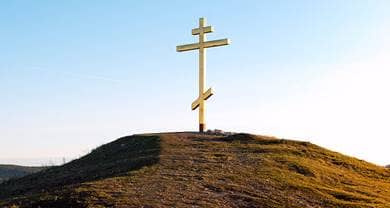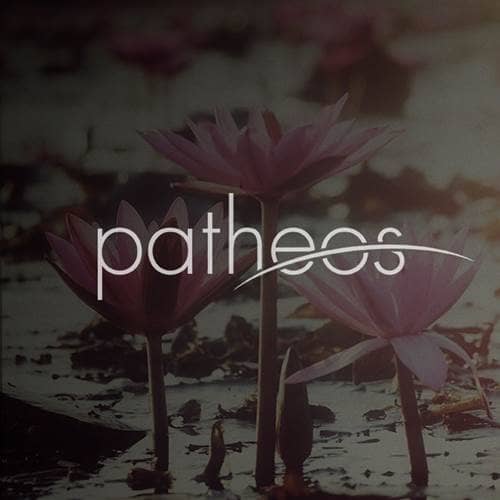- Trending:
- Easter
- |
- Lent
- |
- Forgiveness
- |
- Resurrection
- |
- Joy
- |
- Feminism

RELIGION LIBRARY
Eastern Orthodoxy
Sacred Time
Many Christian festivals and holy days are shared by most Christian communities, including the Eastern Orthodox. This article identifies several of the unique features of the Eastern Orthodox tradition. Along with the great majority of Christians worldwide, Eastern Orthodox Christians worship daily, weekly, and at special times throughout the year. Eastern Orthodoxy is a liturgical faith, meaning that Orthodox services use carefully structured and prescribed rituals, called liturgy.
Eastern Orthodoxy places great emphasis on tradition, and regards its traditions as holy. Holy tradition includes scripture, the Nicene Creed, the decrees of the ecumenical councils, the writings of the Church Fathers, the icons, and the books of liturgical service, which extend to twenty volumes. Although the liturgy has developed and changed, it is characterized by a sense of faithfulness to practices rooted in ancient traditions, perhaps dating from the days of the apostles. Romanian theologian Dumitru Staniloae famously described the spirit of Orthodox tradition as "lived experience . . . the uninterrupted life of the church." At the heart of Eastern Orthodox tradition is the commitment to maintaining the beliefs and practices of the apostolic churches, so that the experience of contemporary Orthodox Christians will conform to the experience of the very first Christians, in an uninterrupted stream of worship and sacrament. Though the word "orthodox" means "correct belief," its connection with "correct practice" is intrinsic to Orthodox faith.
In adherence to tradition, some Orthodox churches still use the old Julian calendar to calculate the dates of the principal festivals of the Christian year. This includes the churches in Jerusalem, Russia, and Serbia. These churches celebrate such principal feasts as Christmas and Easter later than their western counterparts. The Julian calendar is currently 13 days behind the Gregorian calendar, thus westerners will often see Orthodox Christians in Jerusalem and Moscow celebrating major Christian holy days about two weeks later than Christians in the west. However, other Orthodox churches have begun to use the modern Gregorian calendar.
Easter is called Pascha and is the central celebration of the liturgical year. In addition to Easter, which is the Feast of Feasts, the Orthodox liturgical year (which traditionally begins on September 1) is highlighted by the Twelve Great Feasts, eight of which honor Jesus, and four of which honor his mother. They are, in chronological order:
September 8: The Nativity of the Mother of God
September 14: The Exaltation of the Cross
November 21: The Presentation of the Mother of God
December 25: The Nativity of Christ
January 6: The Baptism of Christ
February 2: The Presentation of Jesus at the Temple
March 25: The Annunciation
The Sunday before Easter: Palm Sunday, Jesus' entry in Jerusalem
Forty Days after Easter: The Ascension of Christ
Fifty Days after Easter: Pentecost
August 6: The Transfiguration
August 15: The Dormition (Falling Asleep) of the Mother of God
Three of the feasts are dated in relation to the feast of Easter. The date of Easter is determined by the lunar calendar, which means the date of Easter changes. Easter and these three feasts, Palm Sunday, the Ascension, and the Pentecost, are called "movable" feasts, while the others are "fixed." There is a host of other festivals or feasts, generally fixed, throughout the liturgical year, some of which commemorate significant events in the Gospels, and others that commemorate significant individuals from the Bible, along with angels, saints, and martyrs.
Many liturgical Christians such as Roman Catholics and Anglicans fast in penitence during Advent and Lent. Eastern Orthodox Christians also fast in penitential preparation for significant holy days, but fasting in the east tends to be more rigorous than fasting in the west. Fasting is seen as an important aspect of Christian discipline, purifying the body as well as the soul, and self-control is regarded as a virtue.
There are Four Great Fasts during the Christian year. The Lenten fast begins seven weeks before Easter. The Christmas Fast, which occurs during Advent, lasts 40 days, from November 15 to Christmas Eve. The Fast of the Apostles begins on Monday, eight days after Pentecost, and lasts until June 28, the eve of the Feast of Saints Peter and Paul. The length of this fast varies significantly, from one to six weeks, depending on the date of Easter. Lastly, the Dormition Fast lasts from August 1 to August 14, which is the eve of the Feast of the Dormition of the Theotokos. This commemorates the "falling asleep" or death of Mary, the mother of Jesus. Orthodox Christians may also fast every Wednesday, the day of Judas' betrayal of Jesus, and every Friday, the day of the crucifixion.
Fasting is strict by western standards. Devout Orthodox Christians abstain from meat, fish, dairy, wine, and oil, while others might practice different kinds of fasts, less severe, throughout the year. Married couples will abstain from sex, instead devoting themselves to prayer. Dispensation is granted to those who are physically unable to withstand the deprivations of fasting, such as pregnant and nursing mothers, the very young and the very old, the sick, and those who don't control their diets, such as prisoners and soldiers. Orthodoxy normally relaxes the fast on feast days that occur during the Great Fasts, such as on the Feast of the Transfiguration, which falls during the Dormition Fast.
The repetitive rhythms of feast and fast throughout the calendar year conspire to create a sense of timelessness, connecting the believer to the communion of saints and enfolding the believer in the love of the eternal God.
Study Questions:
1. Why is Eastern Orthodoxy a liturgical faith?
2. How do Eastern Orthodoxy’s rituals transform time?
3. What are some of Eastern Orthodoxy’s liturgical holidays? When do they occur?
4. Describe the process of fasting. How does it create sacred time?










